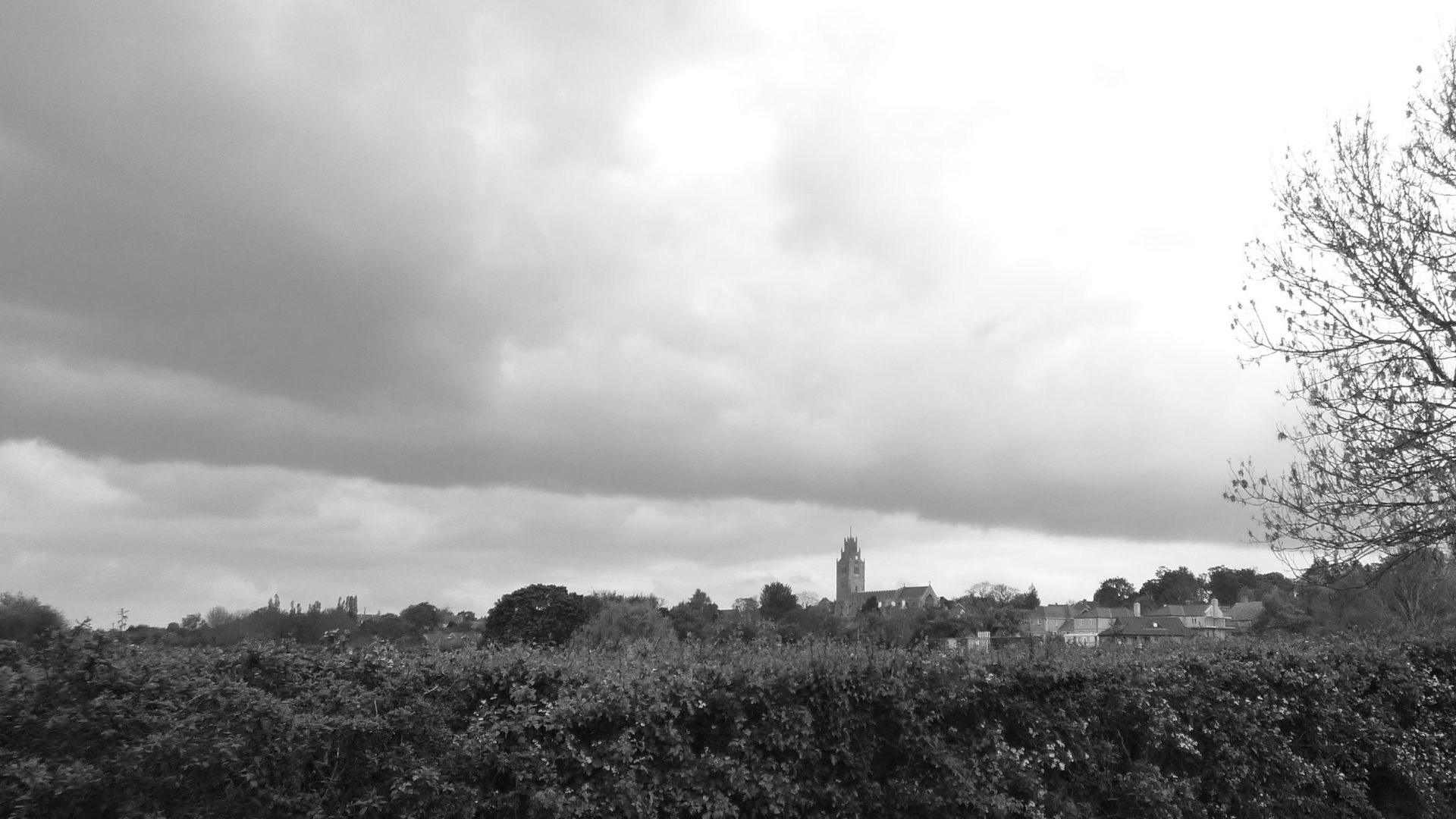Lines horizon fields lines hedges poplars lines rails.
A lark rises straight and clear: its voice, a crystal chain of notes interlinked, each silvered phrase wedded perfectly to the last and falling plumb.
The whip of wind vanished, the tops of trees barely moving. A cigarette lit on the platform, the flame unflickered.
From here, the sun pressing, the countryside caught between the pages of earth and heat, flat and unmoving. From here, a man – you see him, I think. You see him standing there. Rough textured clothes, a cap, greys and whites and browns. He holds his light in that way, in the cup of his hand. That way you’ve seen. Draws on it, the glow shifts and breaks the shadow under the peak a moment. From here, a ripple of coarse fabric. Eyes closed.
His hand drops to his side and he exhales. Looks across the rails, to the other platform. The smoke hangs, lasts.
Lines horizons fields lines hedges poplars lines rails.
He’s hot under the sun. Pull back. Pull back, see the wheat-filled fields. Sharp shadows. He drops the match. The hard crunch of gravel beneath his feet.
He looks at the embroidered handkerchief carefully, pointedly, peaking from his jacket pocket. This is a new detail. The embroidered handkerchief peaking from his jacket pocket.
The smell of tobacco; calico, too. Shoe leather. Polish. Pull back. The shoes will have been newly polished. Tobacco and stale breath. No, coal tar. Soap and starch. As if on cue, he reaches a finger into his collar and eases it away from the skin. Starch, coal tar and a little sweat.
He puts the cigarette in his mouth and reaches for a fob watch. Of course he has a fob watch. And now, yes, you can see, a waistcoat. The watch goes back in the pocket and he looks up and out, across the track, north west.
Across the lines hedges fields poplars rails horizon.
On this corner, this kink in the line, the path of the rail now fades. The road turns ninety degrees and away, but the old track persists, if you try. Try hard, push yourself back. The shadow of the wheat. You can see, just there, you can see it flickering and glitching, the past. It ran through where you stand, well, not you, but there, on the platform. Where the platform used to be. You could see that road through the past, the corner dragging you quickly out of the way. Through the hedge, and out into the field.
Next time, stop the car. It’s inconvenient, others can’t see you until it’s quite late. But it’s important, seemingly. Stop. Get out. Stand there. Imagine. Imagine again, imagine and embellish. Why is it so important?
This track sweeps off and round to the left, vanishing behind a copse that hides the next station, barely a mile away. But at the one after that, the track veers sharply round north and right and heads to the distant fen village there. Sat on a pimple of hillside, enough to lend it primacy here, over the fields, lines, hedges, poplars, a church with an unforgettable tower, the fourteenth century singing over the flatness, a siren on her rock above the sea of wheat.
Two stations away, and the thought drops that you can stand on this platform – where this platform used to be – and look across three miles to the church and there would be no need to check your watch – your fob watch, nestling stylishly in your waistcoat – and surely see the rising steam – hanging, lasting – from here. Can; could. Possibly, I don’t know.
Cars push up quickly, beeping their horns in annoyance.
This museum of thought and fancy exists only for a second. Bishops Barnet and Arundel, who started and continued that tower, were more than three times as distant from the start of the railways as I am, and had no more a concept of such things as I do of the angels and holy messengers who soared and still soar and traced and still trace the shining words of God across the barnack columns, quatrefoils and spandrels.
A man, wearing green farmer’s overalls, walks out of one of the cottages opposite, possibly old railway properties I think, uselessly, later, and stares at me. He has no doubt heard the horns of the drivers caught out by my temporary stop and come to glare me into moving. He’s right, of course. I am not standing on a platform. I am loitering a little dangerously at a field entrance, where a modern tractor works, where I think a platform used to be, and apart from the sombre man staring at me across two hundred yards of shimmering tarmac, there is no one else here. The old station buildings, for what they were, are now repurposed into a bright and busy modern family home.
I look up and shield my eyes, but I can’t see the lark.

Leave a Reply